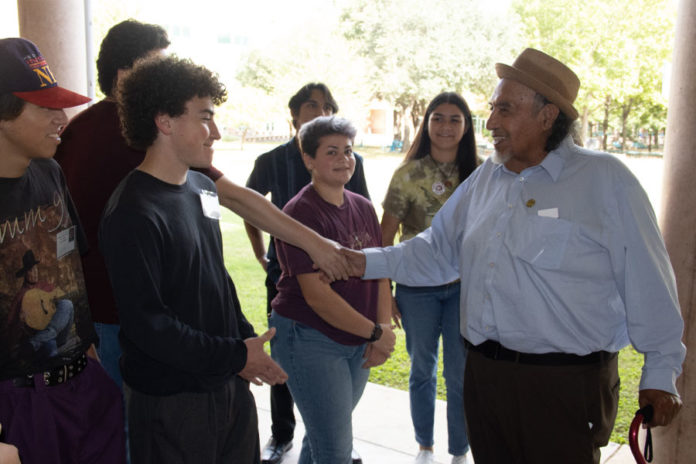The last September 15, 16 and 17, 2022, hundreds of long-time activists gathered in San Antonio to celebrate 50 years of activist work. Fifty years ago, the Chicano movement swept through Texas first and then through other states because young people collectively decided to take a stand against racism and oppression on a mass scale.
At the 50th anniversary party held this past September; we commemorated 50 years of La Raza Unida and heard the voices and stories of so many activists who risked their lives to open opportunities in America for the brown people.
While the two major political parties at first ridiculed this new effort, overall, Hispanics were disrespected during the civil rights movement but in time, gained recognition within a system that opposed the term, “Chicano.”
Chicano/a was a name the Chicano youth chose after being called “Hispanic,” “wet backs,” “beaners,” “chili lips”’ and other derogatory names. If you were Chicano, you were seen as a “warrior for freedom and justice for La Raza,” (the people).
During the late 1960’s, change was in the air. The longing for freedom infected activists that protested the war, groups like the Black Panthers, farm workers and Chicanos were formed. These examples were part of what was termed the civil rights movement. As is typical of most crusades around the world, the foundation of change was in the hands and hearts of the youth.

For the 50th anniversary, there was a gathering of renowned, seasoned activists sharing how they have continued to work in their communities over the years on key issues such as the environment, gay rights, prison reform, and women’s rights. All these movements were and are fueled by young people standing up to oppression.
During 1968 to 1969 the Mexican American Youth Organization (MAYO) sprung up in Southern Texas out of the Barrios of the impoverished. This seems to have been the springboard needed for activists like Jose Angel Gutierrez and others to form the framework for what some called an independent political party called “La Raza Unida.” While this effort had strong outreaches nationwide, the success of the party was most felt directly in Texas. Crystal City, Texas was one such example of where LRU won an election they successively ran.
But the reality of the matter is the goal of Raza Unida was not just to win votes. It was a social movement that was exploring all avenues for social change. One such example was how students held school walks to declare their battle against racism.
In August of 1972, members of Raza Unida held a presidential election in El Paso, Texas to decide between the two major branch leaders. One of those candidates was Corky Gonzalez who led the Colorado contingency named the Crusade for Justice. The other candidate was Jose Angel Gutierrez of Texas. In the end, it was Gutierrez who prevailed.
This was a historic gathering. There were conflicts within the ranks that seemed to at times overwhelm the 3,000 people gathered there. There were strong and courageous leaders that came together to fight for freedom. This was the first time such a monumental event took place. Chicanos had little or no experience in forming a national party and it was, by most accounts, an exciting experience. Reis Lopez Tijerina of the Land Grant Movement of New Mexico was one of the leaders in attendance. Cesar Chavez, who was leading the United Farmworkers in California, was unable to attend.

A panel presenter at the 50th anniversary event from San Antonio was a woman named Rosie Castro who talked about all she did as a young, female activist. It turns out she is the mother of twins- Joaquin and Julian Castro. Joaquin is a U.S. Congressman and Julian was mayor of San Antonio, Texas, and a candidate for President of the United States.
At the anniversary event, attendees remembered the tragic loss of one of their own. On the way to the National Convention in 1972 a carload of Young Chicanos from Colorado stopped at a gas station in Oro Grande, New Mexico and a gas station attendant confronted them. His name was Perry Brunson. In an act of racial hatred, Brunson shot and killed one of the members of the Young Chicanos, Ricard Falcon. Falcon was a young and vibrant 27-year-old leader of the group. Despite overwhelming evidence against him, Brunson was found innocent in court. Many felt that Falcon would have been a major voice within the Chicano Movement if it were not for the fact that he was killed.
Those who were involved with Raza Unida in those early days were the dreamers who envisioned a better world and were willing to fight for it and make whatever sacrifice was necessary.

By the end of 1972, mainstream political parties noticed the energy and power of La Raza Unida and its umbrella Chicano Movement. The Chicano youth began knocking down doors so that fellow Chicano youth could get good jobs, get into colleges, training schools and obtain funding to run their own community organizations.
This time in history pushed everyone into tomorrow with higher expectations and demands. And this allowed many new leaders to stand up and flourish
Historically, when our youth stand up and demand change, we should stand with them as they spread their wings and fly higher than we thought possible.







